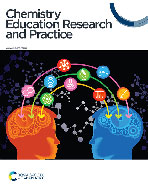Integrating chemistry laboratory–tutorial timetabling with instructional design and the impact on learner perceptions and outcomes†
Abstract
For chemistry, where learners are required to integrate experimental observations with theoretical knowledge, laboratory work appears to be a viable instructional strategy. However, research has shown that chemistry laboratory instruction often fails to live up to its potential. The scheduling practice in higher education (HE) separating theory lessons and practical work into temporally disjointed sessions could exacerbate the theory–laboratory disconnect. This paper continues an earlier work, in which integrated schedules of chemistry tutorial and laboratory classes were implemented in two general chemistry courses in a freshman chemical engineering programme. Traditionally separate tutorial and laboratory classes were chained into 3 hour blocks in the experimental classes. Worked examples, group presentations and course materials designed as a merged package to connect theory with practical work were implemented for selected tasks in integrated teaching. Prior ability was measured based on previous titration experience or grades in earlier general chemistry courses. Lesson experiences were collected on the validated Meaningful Learning in the Laboratory Instrument (MLLI) (Galloway and Bretz, 2015). Block (or integrated) and traditional learners performed equally on theory tests, but integrated learners scored higher on a titration skills assessment. The origin of differences in skills performance could not be ascertained conclusively. Perceptions across the MLLI domains declined across schedules, with significant losses in the cognitive domain. MLLI scores did not differ by schedules. There is some evidence favouring stronger theory–laboratory connection from the qualitative MLLI data and the focus group interviews, although cognitive overloading may adversely impact low ability learners. This work showed that block scheduling does not affect the chemistry skills-set equally, which opens the topic for future research. Suggestions for future implementation of chemistry block teaching were also proposed.


 Please wait while we load your content...
Please wait while we load your content...